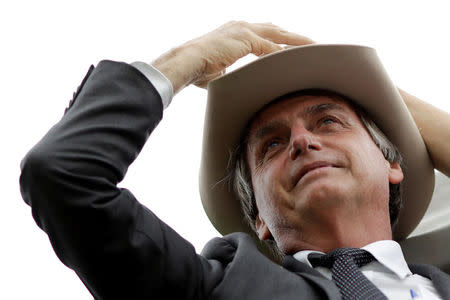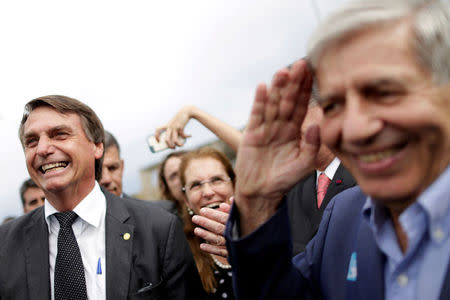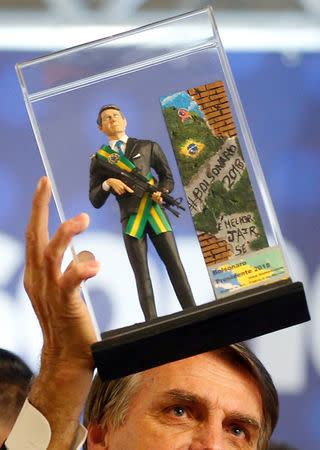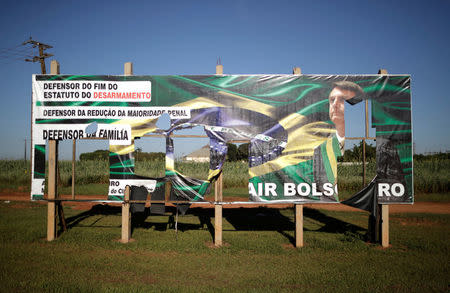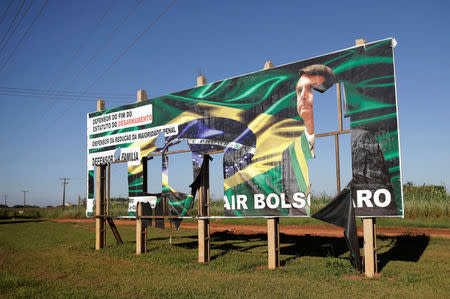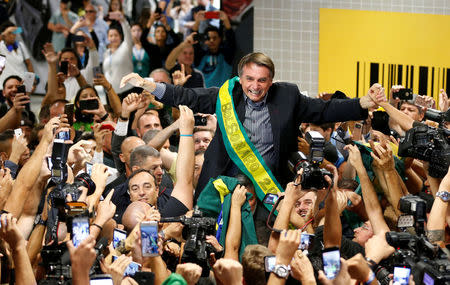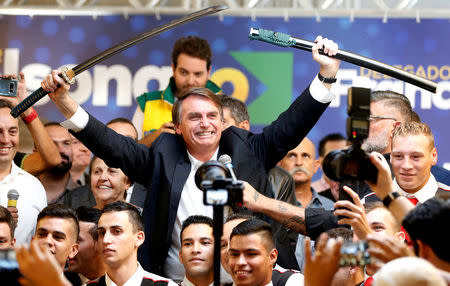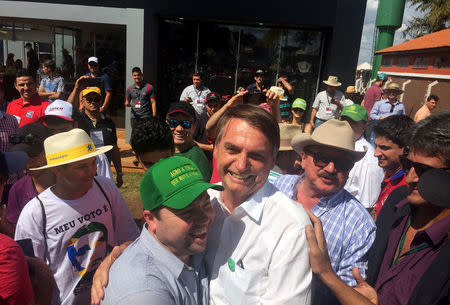Brazil's wealthy farm belt backs Trump-like presidential candidate
By Ana Mano and Anthony Boadle CAMPO NOVO DO PARECIS, Brazil (Reuters) - A right-wing Brazilian presidential candidate who compares himself to Donald Trump is attracting support across Brazil's farm belt, where the fiery former paratrooper may secure the funding needed for his bid to run Latin America's biggest country. Jair Bolsonaro's early lead in national opinion polls for October's presidential race has been dismissed by many pundits because he the lacks the strong party base traditionally needed to win elections in this continent-sized country of 209 million people. Yet the 63-year-old's tough law-and-order stance and plans to ease gun controls, plus his opposition to environmental protections and native land claims are resonating with wealthy landowners in Brazilian farm country. Bumper stickers stating "Bolsonaro Save Brazil" and "We Are All Bolsonaro" are a common sight on pickups in Campo Novo do Parecis, a farm town in the state of Mato Grosso, Brazil's agricultural powerhouse. With the jailing of Brazil's former president Luiz Inacio Lula da Silva for corruption, Bolsonaro, a seven-term congressman, leads a fragmented field with five months to go until the election. A poll this week showed him ahead of environmentalist Marina Silva when Lula's name is excluded. In the midwestern farm states that drive the world's eighth-largest economy, Bolsonaro's lead grows to a commanding 10 percentage points, according to pollster Datafolha. While those states are less populous than coastal regions, they are home to powerful landowners flush with cash from recent bumper crops, whose political donations may be key to building a nationwide campaign for Bolsonaro. For graphic on Latin America's upcoming elections click https://tmsnrt.rs/2rAQ4l1 Tall and thin, with a shock of greying hair combed to one side and an intense gaze, Bolsonaro's biggest selling point in the eyes of many voters is a clean record on corruption when much of the political class has been tarred with graft scandals. With that, they are prepared to overlook his more incendiary comments. Despite his popularity, Bolsonaro only has the backing of a small fringe party. Under Brazil's election laws, that gives him just 10 seconds of free television time when campaigning kicks off, a serious handicap in a nation where TV ads have a big impact. Polls suggest up to 45 percent of voters remain undecided. Bolsonaro's aides say his social media reach will make up for lost TV time, citing a Facebook following more than twice the size of Marina Silva's. With anger at establishment parties riding high in Brazil, the brash iconoclast has compared his candidacy to Trump's 2016 campaign, stirring some voters with fiery speeches while alarming others. Brazil's attorney general charged Bolsonaro last month with inciting discrimination against women, black people, indigenous people and gays. He also faces a Supreme Court trial for inciting rape in a 2014 verbal attack on a congresswoman, whom he called ugly and said he "would not rape because she did not deserve it." "Trump faced the same attacks I am facing - that he was a homophobe, a fascist, a racist, a Nazi - but the people believed in his platform and I was rooting for him," Bolsonaro told Reuters in a September interview. Bolsonaro could not be reached for comment on this story. CRIME IN FARM COUNTRY Bolsonaro's hardline rhetoric on crime has also inspired grassroots organizing in the midwest region, where prosperous farms are threatened by land invasions and increasing robberies. "If we could have rifles like ranchers in the United States, that would deter criminals," said farmer Flavio Giacomet. "He is not the savior who will end corruption and crime, but of the candidates out there today, I would vote for him." A recent survey by Brazilian agriculture lobby CNA showed an increase in armed robbery on farms, with organized gangs seizing machinery and costly fertilizers and pesticides. In rural parts of Mato Grosso, robberies are up 60 percent and murders jumped 44 percent in the last five years, according to data from the state government. Bolsonaro's criticism of environmental licensing rules and state interference in the economy also "are music to farmers' ears," said Endrigo Dalcin, former president of Mato Grosso grain farmers group Aprosoja. Comments on China "taking over" Brazil appear not to have dented his support among farmers, although the Asian giant is by far the biggest buyer of Brazilian grains. Bolsonaro told Reuters last year that his foreign policy priority if elected would be to strengthen ties with the Trump administration and aim to restore the United States as Brazil's top trade partner, a position it lost to China in 2009. "I don't see Bolsonaro's rhetoric as anti-China. It is more about regulating Chinese investments in Brazil," said Antonio Galvan, vice president of Aprosoja. "I don't think he is referring to Brazil not selling its products to China. That would not make any sense." Ever since Brazil banned corporate donations to political campaigns, candidates have targeted wealthy farmers for financing and Bolsonaro's bid will rely on rural donations. Giacomet and other farmers told Reuters they would donate money to Bolsonaro's campaign but only if he emerges as a viable contender with a coalition of parties behind him. BULLET, BEEF AND BIBLE LOBBY Bolsonaro has pledged to end the expansion of indigenous reservations as native communities claim more land rights in the face of the steady advance of Brazil's agricultural frontier into what was once the Amazon rainforest. He supports changing laws to allow commercial agriculture and mining on reservations, backing bills that could clear an increasingly conservative Congress. Bolsonaro was the only presidential hopeful to appear this month at the inauguration of Brazil's biggest farm equipment fair, the Agrishow expo in Sao Paulo's sugarcane belt. Supporters there broke into chants and he was cheered when he climbed aboard a tractor and revved up the engine. He said his connection with the crowd came from his honesty and religious convictions. "We will not make a deal with the Devil to get elected," said Bolsonaro, whose middle name means 'Messiah'. "Our commitment is to God and the people." Bolsonaro's rise is part of a sharp rightward swing in Brazilian politics, led by market-friendly President Michel Temer who took over from impeached leftist Dilma Rousseff in 2016, ending 14 years of rule by Lula's Workers Party. Despite Brazil's reputation for tolerance, a conservative alliance of evangelical Christians, farm state lawmakers and pro-gun politicians has steadily advanced in Congress, holding 230 of the 513 seats in the lower house. This broad caucus, popularly known as the "Bullet, Beef and Bible Lobby", wants to ease gun sales, tighten Brazil's already restrictive abortion laws and give Congress final say in defining indigenous reservations — all planks in Bolsonaro's platform. The CNA farm lobby said it does not endorse presidential candidates, nor will the Congressional farm caucus, whose members come from different parties. But that is not dampening enthusiasm in rural Brazil. "The whole town is campaigning hard for him," said Gilvia Casarin, a bank manager in Campo Novo do Parecis. "They cannot think of a better name than his." (Reporting by Ana Mano and Anthony Boadle, additional reporting by Ricardo Brito in Brasilia and Marcelo Teixeira in Ribeirão Preto; editing by Brad Brooks, Daniel Flynn and Rosalba O'Brien)
